
Bluto, at times known as Brutus, is a cartoon and comics character created in 1932 by Elzie Crisler Segar as a one-time character, named "Bluto the Terrible", in his Thimble Theatre comic strip. Bluto made his first appearance on September 12 of that year. Fleischer Studios adapted him the next year (1933) to be the main antagonist of their theatrical Popeye animated cartoon series.

Fleischer Studios was an American animation studio founded in 1929 by brothers Max and Dave Fleischer, who ran the pioneering company from its inception until its acquisition by Paramount Pictures, the parent company and the distributor of its films. In its prime, Fleischer Studios was a premier producer of animated cartoons for theaters, with Walt Disney Productions being its chief competitor in the 1930s.
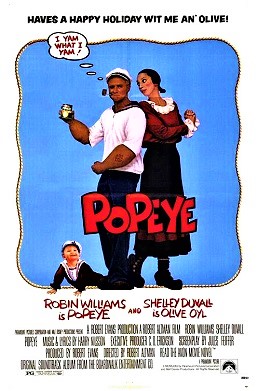
Popeye is a 1980 American musical comedy film directed by Robert Altman and produced by Paramount Pictures and Walt Disney Productions. It is based on E. C. Segar's Popeye comics character. The script was written by Jules Feiffer, and stars Robin Williams as Popeye the Sailor Man and Shelley Duvall as Olive Oyl. Its story follows Popeye's adventures as he arrives in the town of Sweethaven.

Popeye the Sailor Meets Sindbad the Sailor is a 1936 two-reel animated cartoon short subject in the Popeye Color Specials series, produced in Technicolor and released to theatres on November 27, 1936, by Paramount Pictures. It was produced by Max Fleischer for Fleischer Studios and directed by Dave Fleischer, with the title song's music composed by Sammy Timberg and lyrics written by Bob Rothberg. The voice cast includes Jack Mercer as Popeye, Gus Wickie as Sindbad the Sailor, Mae Questel as Olive Oyl and Lou Fleischer as J. Wellington Wimpy.

Popeye the Sailor Meets Ali Baba's Forty Thieves is a two-reel animated cartoon short subject in the Popeye Color Specials series, produced in Technicolor and released to theatres on November 26, 1937 by Paramount Pictures. It was produced by Max Fleischer for Fleischer Studios, Inc. and directed by Dave Fleischer. Willard Bowsky was head animator, with musical supervision by Sammy Timberg. The voice of Popeye is performed by Jack Mercer, with additional voices by Mae Questel as Olive Oyl, Lou Fleischer as J. Wellington Wimpy and Gus Wickie as Abu Hassan.

Aladdin and His Wonderful Lamp is a two-reel animated cartoon short subject in the Popeye Color Specials series, produced in Technicolor and released to theaters on April 7, 1939, by Paramount Pictures. It was produced by Max Fleischer, and directed by Dave Fleischer for Fleischer Studios, Inc., with David Tendlar serving as head animator, and music being supervised by Sammy Timberg. The voice of Popeye is performed by Jack Mercer, with additional voices by Margie Hines as Olive Oyl and Carl Meyer as the evil Wazzir.
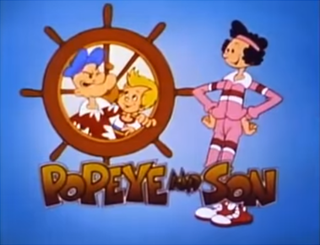
Popeye and Son is an American animated comedy series based on the Popeye comic strip created by E.C. Segar and published by King Features Syndicate. Jointly produced by Hanna-Barbera and King Features subsidiary King Features Entertainment, the series aired for one season of thirteen episodes on CBS from September 19 to December 12, 1987. It is a follow-up to The All New Popeye Hour. Due to Jack Mercer's death in 1984, Maurice LaMarche voiced Popeye, while much of the cast of The All New Popeye Hour reprised their respective roles, with the exception of Daws Butler. However, Nancy Cartwright, who was trained by Butler, voiced Woody in the series.
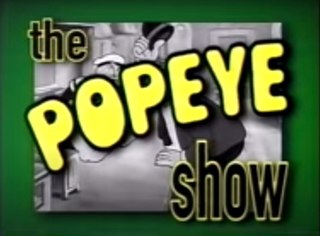
The Popeye Show is an American cartoon anthology series that premiered on November 12, 2001, on Cartoon Network. Each episode includes three Popeye theatrical shorts from Fleischer Studios and/or Famous Studios. The show is narrated by Bill Murray, who gives the audience short facts about the history of the cartoons as filler material between each short. Animation historian Jerry Beck served as a consultant and Barry Mills served as writer and producer. A total of 45 episodes were produced, consisting of a total of 135 shorts. The series was originally planned to premiere on October 29, 2001 with "Episode 1" before being pulled at the last minute. "Episode 2" would instead act as the series premiere, airing on November 12, 2001, while "Episode 1" would premiere on November 19, 2001.
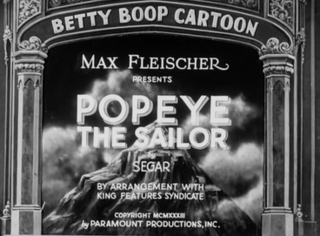
Popeye the Sailor is a 1933 animated short produced by Fleischer Studios and distributed by Paramount Publix Corporation. While billed as a Betty Boop cartoon, it was produced as a vehicle for Popeye in his debut animated appearance.

Christmas Comes But Once a Year is a 1936 animated short produced by Fleischer Studios and released on December 4, 1936 by Paramount Pictures. It is part of the Color Classics series. The cartoon features Professor Grampy, a character from the Betty Boop series; this is the character's only appearance without Betty. An edited version was featured during the Pee-wee's Playhouse Christmas Special in 1988, as the featured short shown by the King of Cartoons.
This is a list of the 122 cartoons of the Popeye the Sailor film series produced by Famous Studios for Paramount Pictures from 1942 to 1957, with 14 in black-and-white and 108 in color. These cartoons were produced after Paramount took ownership of Fleischer Studios, which originated the Popeye series in 1933.

Popeye the Sailor is an American animated television series produced for King Features Syndicate TV starring Popeye that was released between 1960 and 1963 with 220 episodes produced. The episodes were produced by multiple animation studios and aired in broadcast syndication until the 1990s.

Popeye the Sailor is an American animated series of short films based on the Popeye comic strip character created by E. C. Segar. In 1933, Max and Dave Fleischer's Fleischer Studios, based in New York City, adapted Segar's characters into a series of theatrical cartoon shorts for Paramount Pictures. The plotlines in the animated cartoons tended to be simpler than those presented in the comic strips, and the characters slightly different. A villain, usually Bluto, makes a move on Popeye's "sweetie", Olive Oyl. The villain clobbers Popeye until he eats spinach, giving him superhuman strength. Thus empowered, Popeye makes short work of the villain.
Spooky Swabs is a Popeye theatrical cartoon short, starring Jack Mercer as Popeye, Mae Questel as Olive Oyl and Mercer, Jackson Beck, Sid Raymond and Gilbert Mack as the ghosts. Produced by Paramount Cartoon Studios and directed by Isadore Sparber, it was released in 1957 and is the final cartoon in the Popeye series of theatrical cartoons released by Paramount Pictures.

You're a Sap, Mr. Jap is a 1942 one-reel anti-Japanese Popeye the Sailor animated cartoon short subject released by Paramount Pictures on August 7, 1942. It was the first cartoon short to be produced by Famous Studios. It is one of the best-known World War II propaganda cartoons.

Popeye the Sailor is a fictional cartoon character created by Elzie Crisler Segar. The character first appeared on January 17, 1929, in the daily King Features comic strip Thimble Theatre. The strip was in its tenth year when Popeye made his debut, but the one-eyed sailor quickly became the lead character, and Thimble Theatre became one of King Features' most popular properties during the 1930s. Following Segar's death in 1938, Thimble Theatre was continued by several writers and artists, most notably Segar's assistant Bud Sagendorf. The strip continues to appear in first-run installments on Sundays, written and drawn by R. K. Milholland. The daily strips are reprints of old Sagendorf stories.
Fright to the Finish is a 1954 animated American short film directed by Seymour Kneitel and Al Eugster starring Jack Mercer as Popeye. The short was released by Paramount Pictures on August 27, 1954.

Blow me Down! is a Popeye theatrical cartoon short in the Paramount Picture short series. It was released in 1933 and was the third cartoon in the Popeye the Sailor series of theatrical cartoons released by Paramount Pictures. The title also corresponds to one of Popeye's most notable catchphrases.

Let's You and Him Fight is a Popeye theatrical cartoon short released in February 16, 1934, starring Billy Costello as Popeye, Bonnie Poe as Olive Oyl, William Pennell as Bluto and Charles Lawrence as the announcer.
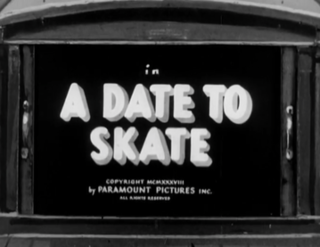
A Date to Skate is an American animated short film, released on November 18, 1938 and starring Jack Mercer as the voice of Popeye.

















